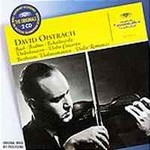
Bach/Brahms/Tchaikovsky: Violin Concertos
 $42.00
Low Stock
add to cart
$42.00
Low Stock
add to cart
J.S. BACH / BRAHMS / TCHAIKOVSKY / etc
Bach/Brahms/Tchaikovsky: Violin Concertos
David Oistrakh, Igor Oistrakh (violins) / Wiener Symphoniker / Royal Philharmonic Orchestra / Staatskapelle Dresden
[ Deutsche Grammophon Originals / 2 CD ]
Release Date: Friday 1 December 2006
This item is only available to us via Special Import.
"strong, warm performances which bring out both the sweetness and purity of Oistrakh's playing"
(Gramophone)
"Though the arrival of LP brought an explosion in recording activity, the period before stereo emerged has become something of an interregnum, too often ignored by the big companies in their reissue policy. It is good here to welcome the mono recordings of the Brahms and Tchaikovsky concertos which David Oistrakh made in February 1954, more volatile readings than those he recorded later, respectively with Klemperer for EMI in the Brahms (3/93) and with Ormandy for CBS in the Tchaikovsky (11/89). Here, working with Konwitschny and the Dresden orchestra, he seems to be more relaxed, more freely expressive, moving easily from dashing bravura to the sweetest lyricism in the first movement of the Brahms, and entering in the slow movement at a faster pace than his conductor, clearly determined to expunge the suspicion of stodginess in the opening tutti. In the finale of the Brahms there is barely any difference in the speed of the opening between Konwitschny or Klemperer, but with Konwitschny Oistrakh feels free to press ahead, where with Klemperer it tends to be the opposite, so that the overall timing for the movement is some 35 seconds longer. In the Tchaikovsky Ormandy is also a more solid interpreter than Konwitschny, and though in the first movement that encourages Oistrakh into deliberate expressive dalliances, generally he is more freely expressive with Konwitschny, and more spontaneous sounding.
Though his partners were the same in the DG recordings of both concertos, the venues were different, with some unwanted edge on the violin sound in the Berlin-made Brahms, where with East German engineers in the Dresden-made Tchaikovsky the solo violin is warmer, even if the orchestral sound is duller. In both the violin is balanced close. Both performances are welcome additions to the recorded oeuvre on CD of the supreme Soviet violin master.
The Bach and Beethoven offerings are hardly less welcome. The Bach Double Concerto, with Oistrakh father and son accompanied by Goossens and the RPO, first appeared in a coupling with the Beethoven Romances as well as the Vivaldi Concerto, Op. 3 No. 8, also for two solo violins. I am sorry that no room was found for that as well in this compilation, but it was obviously more important to have the two solo Bach concertos in the package, which within a few months of the original issue was the alternative coupling for the Double Concerto. There, with the Vienna Symphony Orchestra, Oistrakh himself directs from the solo violin, but tuttis tend to be rather solid rhythmically until his solo entries, which seem to lighten the playing of everyone. None the less, allowing for the performance practice of the time these are strong, warm performances which bring out both the sweetness and purity of Oistrakh's playing, not least in the rapt accounts of the slow movements. The first of the two Beethoven Romances brings wonderfully clean and true double-stopping at the start, and few performances of either work have matched these for ease and warmth."
(Gramophone)
Tracks:
Bach, J S:
Violinkonzerte Nos. 1 + 2
Doppelkonzert BWV1043
Beethoven:
Romances Nos. 1 & 2 for Violin and Orchestra
Brahms:
Violin Concerto in D major, Op. 77
Tchaikovsky:
Violin Concerto in D major, Op. 35
